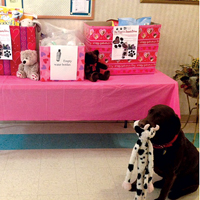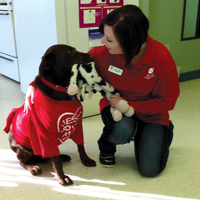
Even if you are blessed to have a wonderful spouse, any animal lover will tell you: There’s nothing like hugging a dog at the end of a long day or when you’re feeling sad.
That’s a lesson Sue VanDeRostyne, RN, MS-HSA, LNHA, the Administrator at Toulon Rehab & Health Care Center in Illinois, knew when fate intertwined and brought her into the path of Rusty the dog. A pet food and supply drive is being held at the center this month in honor of Rusty, a decision made by the center’s resident council. All items will be donated to the Henry County Humane Society in nearby Kewanee.
Rusty’s journey to Toulon began when he wandered into Sue’s sister’s yard with an out-of-state rabies tag. It was clear “he had been on the run,” the vet told them. Both of the sisters’ homes were already full, plus Rusty had belonged to someone at some point, so he spent some time waiting to be claimed or adopted at the shelter. When it became clear no one was coming, and that Rusty’s time was almost up, Sue’s sister said, “You have to take him. Take him to the nursing home.”
VanDeRostyne said she brought in the chocolate Labrador, who is around 8 now, on a trial basis, and planned to take him home on weekends. But it became clear that Rusty had found his calling, and he soon took up residence at Toulon Rehab & Health Care around-the-clock.
He has a special connection with residents, especially those with Alzheimer’s or dementia, says VanDeRostyne and activity director Michelle Spears.
“They just lighten up,” VanDeRostyne told me. “He gets called so many different names because people who have had dogs in the past call him ‘Brownie’ or ‘Missy.’ He’ll go over to them, he’ll come and walk right over to the wheelchair and will stay until they’re done petting him.”
Rusty wanders the facility, and knows to stay out of the dining room. He is so beloved that he became a bit of a “lady of the night” when it comes to getting treats, which led to some weight gain. Resident Frank put him on an exercise program, including playing ball in one of the courtyards, which has helped. Rusty also can be involved in activities and therapy, even though he’s not a trained therapy dog.
“We had a resident who wouldn’t participate in therapy,” VanDeRostyne explains. “But he loves Rusty. We got the idea of getting Rusty’s toy, and having the resident throw the toy. It was a diversional way to get him to do that activity, and they’d do their therapy session together.” 
VanDeRostyne offers practical advice for other administrators looking to bring in a resident dog. Dog food is bought through an activities fund, and recently a family donated memorial money that they earmarked for Rusty. His immunizations and any other veterinary costs will come out of that and other donations.
She also sought buy-in from staff, and says, “Initially, the head of housekeeping had a fit.” It’s true that Rusty sheds, but VanDeRostyne points out the activity room has to be cleaned up to three times a day anyway.
Now “they are the best buds,” she says of housekeeping staff and Rusty.
“We were very fortunate getting him,” she says of the pooch.
Toulon Rehab isn’t the first, of course, to embrace the concept of animals in a nursing home. I wrote two years ago about Annie at Regency Nursing Care, and the Eden Alternative encourages pets as a way to reduce loneliness. We know pets can reduce blood pressure, and that trained therapy animals can even slow down the progression of dementia in nursing home residents.
Even if you’re not convinced, take a moment to watch this simple video from the Maryland SPCA, where, full disclosure, I adopted a big orange cat eight years ago. Or if you are in Illinois, consider visiting Toulon on Feb. 28, where shelter manager Kellie Wallace-McKenna will be bringing in animals that would be good senior companions.
Maryland SPCA: Feel the Warmth of a Cold Nose from Maryland SPCA on Vimeo.
The Maryland SPCA’s mission is to improve the lives of pets and people in the community. We are dedicated to helping both pets and people and to saving the lives of animals in the community. There is no time limit for an animal to stay in our care until he is adopted. We receive no operating funds from the government or the ASPCA. We rely on donations to continue our work. Your support saves lives!




